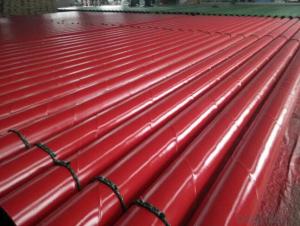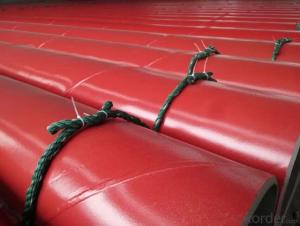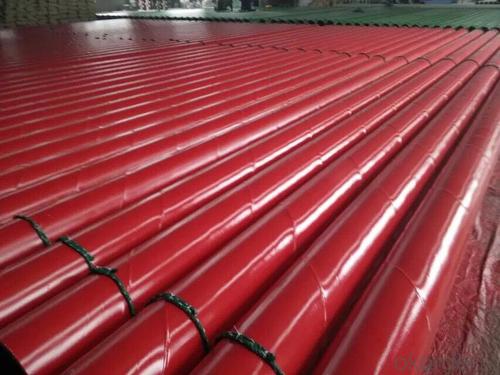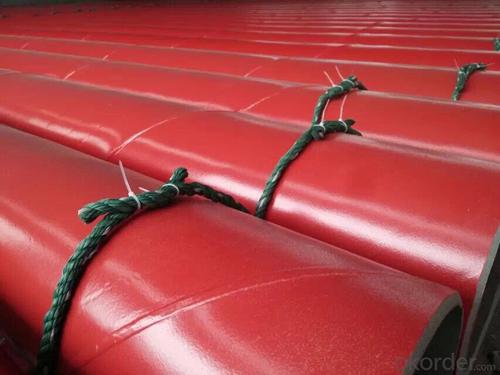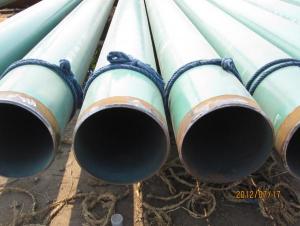LSAW 2PE 3PE steel pipe external coating
- Loading Port:
- China Main Port
- Payment Terms:
- TT OR LC
- Min Order Qty:
- -
- Supply Capability:
- -
OKorder Service Pledge
OKorder Financial Service
You Might Also Like
Specifications
water pipeline inner-layer tape
1 Butyl rubber as adhesive
2. SGS test report and DVGW certificate
3. corrosion protection
water pipeline inner-layer tape
State-of-the-Art Pipeline Protection for All Climates & Environments
System description:
WATER PIPELINE Inner -layer tape also be called pipe wrap anti-corrosion tape, polyethylene wrap tape.
water pipeline Inner-layer tapeT100 is engineered to assure a high bond to the primed pipe surface with excellent conformability characteristics, aggressive adhesive for corrosion protection and repair of main line coatings.
Inner-layer tapeT100 series is cold applied tape coating system for corrosion protection of Oil, Gas, Petrochemical, and Waste Waterburied pipeline, pipe can be buried, also can be underground ,overhead ,onshore and offshore .
Structure of water pipeline inner wrap tape
The specification of the tape consists of two layers, adhesive layer and film backing
Adhesive: butyl rubber
Film backing: Special blend of stabilized polyethylene
Features & Benefits
Provides a permanent bond to the primed steel pipes surface and provides protection against chemical electrolytic corrosion for underground pipelines.
long term corrosion protection
Worldwide reference lists. Established in-ground history
High chemical resistance under service temperature.
Outstanding electric property and permanent adhesion.
Cold applied, No release liner. Makes installation fast and easy.
Complies with EN-DIN 30672 and AWWAC-214 international standards and also ASTM standards.
Be used for water pipeline corrosion protection
System Properties
Type | T138 | T 150 | T165 | T180 | T 250 | T265 | T280 | |
Thickness | 15mil 0.38mm | 20mil 0.508mm | 25mil 0.635mm | 30mil 0.762mm | 20mil 0.508mm | 25mil 0.635mm | 30mil 0.762mm | |
Backing | 9mil 0.229mm | 9mil 0.241mm | 10mil 0.25mm | 10mil 0.25mm | 15mil 0.38mm | 20mil 0.508mm | 25mil 0635mm | |
Adhesive | 6mil 0.152mm | 11mil 0.279mm | 15mil 0.381mm | 20mil 0.508mm | 5mil 0.127mm | 5mil 0.127mm | 5mil 0.127mm | |
When used for ductile iron pipes inner layer 980-20 or 980-25 and outer layer 955-20 or 955-25 are recommended. | ||||||||
Elongation | ³300% | ³400% | ||||||
Tensile Strength | 55 N/cm | 70 N/cm | ||||||
Color | Black | White | ||||||
Peel Adhesion to Primed Pipe | 33 N/cm | |||||||
Dielectric Strength | 30 KV | |||||||
Dielectric Breakdown | 26 KV/mm | |||||||
Cathodic Disbandment | 0.24 in radius 6.4 mm | |||||||
Water Vapor Transmission Rate | < 0.1% | |||||||
Volume Resistivity | 2.5 x 1015 ohm.cm | |||||||
Impact resistance | 5.5Nm | |||||||
Penetration Resistance | <15% | |||||||
Performance | AWWA C-209,ASTM D 1000,EN 12068 | |||||||
Order information
Length | 100ft(30 M),200ft(60 M),400ft(120 M),800ft(240 M) |
Width | 2’’(50mm),4’’(100mm),6’’(150mm),17’(450mm),32’’(800mm) |
- Q: Can steel pipes be used for underground sewer systems?
- Yes, steel pipes can be used for underground sewer systems. Steel pipes are known for their durability, strength, and resistance to corrosion, making them a suitable choice for underground applications such as sewer systems. However, it is important to consider factors like soil conditions, potential for corrosion, and local regulations before selecting steel pipes for an underground sewer system.
- Q: How are steel pipes recycled at the end of their life cycle?
- Steel pipes are typically recycled at the end of their life cycle through a process called steel scrap recycling. This involves collecting the used pipes, cleaning them to remove any contaminants, and then shredding or cutting them into smaller pieces. These pieces are then melted down in a furnace to create new steel products, including pipes. The recycled steel pipes are then ready for use in various industries, reducing the need for new production and conserving valuable resources.
- Q: What's the difference between a cracked carbon steel tube and a liquid carbon steel tube?
- Cracking carbon steel pipe higher requirements, the general carbon steel pipe to be normalized, the fluid carbon steel pipe as long as the normal annealing treatment.
- Q: How do steel pipes handle vibrations?
- Steel pipes are known for their ability to handle vibrations effectively. Due to their strong and rigid nature, steel pipes can withstand various types of vibrations, including mechanical vibrations and seismic activities. The resilience of steel pipes is attributed to their structural integrity and strength. Steel pipes have high tensile strength, which enables them to resist deformation or breakage when subjected to vibrations. They are also resistant to fatigue, meaning they can endure repeated vibrations without experiencing any significant damage. This makes steel pipes ideal for applications that involve constant or cyclic vibrations, such as in industrial settings or for transportation of fluids through pipelines. Moreover, steel pipes have the advantage of being able to dampen vibrations due to their mass. The weight of the steel pipe helps absorb and dissipate the energy produced by vibrations, preventing excessive movement or oscillation. This damping effect contributes to the overall stability and durability of the pipe system. To further enhance the ability of steel pipes to handle vibrations, various measures can be taken. These may include the use of vibration isolators or dampers, which are devices designed to reduce the transmission of vibrations from the surrounding environment. Additionally, proper installation techniques and regular maintenance can help ensure that steel pipes continue to perform optimally under vibration-prone conditions. In summary, steel pipes are well-suited to handle vibrations due to their strength, resistance to fatigue, and ability to dampen vibrations. Their robustness and durability make them a reliable choice for applications where vibrations are a concern, ensuring the safe and efficient transport of fluids or materials.
- Q: Can steel pipes be used for transporting drinking water?
- Indeed, steel pipes have the capacity to transport drinking water. These pipes are extensively employed in water distribution networks and have a long history of usage. Renowned for their robustness, potency, and ability to resist corrosion, steel pipes are highly favored. Nonetheless, it is imperative to ensure that steel pipes designated for drinking water transportation are adequately coated or lined in order to avert any potential contamination originating from the metal. Moreover, it is crucial to conduct routine inspections and maintenance to safeguard the pipes' integrity and to forestall any leaks or ruptures that could jeopardize the water's quality.
- Q: Can steel pipes be used for gas lines?
- Yes, steel pipes can be used for gas lines. Steel pipes are commonly used for gas lines due to their durability, strength, and resistance to extreme temperatures. They are able to withstand high pressure and are typically coated with corrosion-resistant materials to ensure the safety and longevity of the gas line system.
- Q: What are the safety measures to be followed while working with steel pipes?
- Some safety measures to be followed while working with steel pipes include wearing appropriate personal protective equipment such as gloves, safety glasses, and steel-toed boots to protect against cuts, burns, and falling objects. It is important to inspect the pipes for any defects or damage before handling them and to use proper lifting techniques to avoid strain or injury. Additionally, workers should be trained on how to properly use cutting and welding equipment to prevent accidents or fires. Regular maintenance and inspections of tools and equipment should be conducted to ensure their safe operation.
- Q: How are steel pipes used in the construction of skyscrapers?
- Steel pipes are used in the construction of skyscrapers primarily for their strength and durability. These pipes provide structural support and serve as columns, beams, and foundations, helping to distribute the weight and withstand the immense forces exerted on tall buildings. Additionally, steel pipes are used for plumbing and HVAC systems, allowing for efficient water supply, drainage, and climate control throughout the skyscraper.
- Q: What is lined pipe?
- There are inner pipe jacket, such as day, tube, etc.; there are outside the pipe painted, such as large-diameter water pipes. An internally coated steel pipe for corrosive medium fluids replaces the expensive stainless steel pipe.
- Q: How are steel pipes used in the manufacturing of pulp and paper mills?
- Steel pipes are commonly used in the manufacturing of pulp and paper mills for various purposes. They are primarily utilized for transporting water, chemicals, and steam throughout the mill's processes. Steel pipes are also employed for structural support, such as in the construction of storage tanks, conveyors, and equipment frames. Additionally, they are used for providing compressed air, ensuring efficient operation of machinery and processes. Overall, steel pipes play a crucial role in facilitating the smooth functioning and efficient production of pulp and paper mills.
Send your message to us
LSAW 2PE 3PE steel pipe external coating
- Loading Port:
- China Main Port
- Payment Terms:
- TT OR LC
- Min Order Qty:
- -
- Supply Capability:
- -
OKorder Service Pledge
OKorder Financial Service
Similar products
Hot products
Hot Searches
Related keywords
